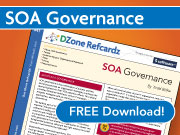 Assessments and evaluations
Assessments and evaluations
James McGovern recently posted on the subject of self-evaluation. I’m guessing that it must be annual review time at his place of employment. He makes some generalizations that I agree with, stating that it is “human nature to either trivialize and/or underestimate capabilities in other folks that they do not possess.” I believe the opposite is true as well: people tend to over-estimate and over-emphasize capabilities that are similar to their own.
While James’ chose to focus on how ineffective the typical evaluation and assessment process is for employees, I’d like to take it a different direction. While I agree that most people aren’t very good at assessing others, and probably even worse at assessing themselves (it can go either way, overly negative or overly positive), that doesn’t mean the practice should be abandoned, particularly that of the self-assessment.
One of the things that I’ve seen stated in articles and books, as well as experienced first hand in discussions, is the relationship of a solid self-understanding to being successful. You need to know your strengths and you need know your weaknesses, and you need to be objective about them. The successful leaders don’t go out and find people with the exact same strengths as their own. They go out and find people that complement their strengths. For example, I consider myself a big picture thinker, probably a common trait among architects. At the same time, I recognize that I’m not a very detail-oriented person. While I can certainly be an active participant in a project-planning workshop putting my fair share of post-it notes, seeing the details does not come natural to me. For others, the exact opposite is true. They are able to see all the i’s that need to be dotted and all the t’s that need to be crossed, but they may not be able to tell you the paragraph that’s being written. So, when I’ve been assigned to a project in a leadership position, the first thing I always request is that the stakeholders find someone who is very detail oriented to work with me. While I’m sure that person will drive me nuts at times, the project won’t be successful without it. Do I continue to learn and improve? Sure. A key to success is to understand your strengths AND your weaknesses, and surround yourself with people who can complement you.
The other important thing that needs to be called out, which James did in his blog, is the importance of objectivity when performing an assessment. Well, what is objectivity? The truth is, there’s almost always going to be some amount of subjectivity associated with any assessment. Where does this subjectivity begin from? It will usually stem for the reference model that is used for comparison. If this reference model is documented, and both parties agree to it beforehand, you’ve at least eliminated one variable from the equation. The less that is formally documented, the more difficult the assessment becomes.
For example, if I were to come in and perform an SOA assessment on an organization, I need to have a reference model that I compare my findings against. There’s a problem, however, if the things that I deem important aren’t the things that you deem important. The process must begin with a mutual understanding of the things that will be assessed, and the criteria that they will be evaluated against. In my previous job, I was discussing a potential assessment with some vendors (consultants and product vendors), and some of them wanted to cram their model down my throat, even though it would have focused on a number of things that I knew we hadn’t done anything with yet. That would have been a waste of my time and theirs.
So how does this work for self-assessments? Again, you need to have a point of comparison when you evaluate yourself. If your reference model is out of whack, your assessment will be too. I don’t want my daughters or my son growing up and comparing themselves to what the media may portray as “important” for young women or young men. That’s a problem with the reference model. This reference model has to be independent of what your boss wants or what your company wants. Why? Without it, how will you know when it’s time to make a change? Your company has its own needs and desires. You have your own needs and desires. The best possible situation is where both needs are met. That won’t always be the case, however, that’s why people (should) change jobs or even companies. If the things you find important don’t match what the company finds important, that doesn’t mean you are a lousy employee or that your company is lousy. It just means that the needs don’t match and it’s time to make a change. That could mean a move within the company, or it may mean leaving. You can only know this if you’ve got a solid understanding of what you want to do, when you want to do it, and whether you’re capable of doing it. To do this, you have to begin with your own assessment.
My final piece of advice on this is pretty simple. Anytime you do an assessment, you should strive for some amount of balance. There should always be things that you want to call out as well done, and there should always be things that you want to improve. If everything looks rosy, or everything needs improvement, then you’ve got an unrealistic view of yourself.
